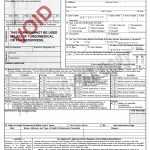As some of you may know from previous posts, the Department of Justice (“DOJ”) has been prosecuting certain pilots who are veterans and failed to disclose that they were receiving Veterans Administration (“VA“) disability benefits. In these cases, the VA benefits were based upon medical conditions that would likely have either disqualified the airmen from receiving a medical certificate or would have certainly subjected the airmen to additional scrutiny and/or testing requirements by the FAA’s Office of Aerospace Medicine.
 The airmen were “caught” when the FAA cross-checked its database of airmen holding medical certificates with the VA’s disability benefits database.
The airmen were “caught” when the FAA cross-checked its database of airmen holding medical certificates with the VA’s disability benefits database.
This latest round of prosecutions is similar to the FAA’s 2002 Operation Safe Pilot in which it performed a similar cross-check, but with the Social Security Administration’s (“SSA“) disability database. Operation Safe Pilot resulted in prosecution of forty pilots who were receiving SSA disability benefits for conditions that would have either disqualified the airmen from receiving a medical or would have triggered further inquiry by the FAA.
The Case
In one of the latest cases to go to trial, U.S. v. Beyers, the airman was charged with making false statements and concealing material facts from the FAA in violation of 18 U.S.C. §§ 1001(a)(1) and (2).  Specifically, the DOJ alleged the airman stated on two FAA Form 8500-8 Applications for Airman Medical Certificate:
Specifically, the DOJ alleged the airman stated on two FAA Form 8500-8 Applications for Airman Medical Certificate:
- that he did not have and had never had a mental disorder of any sort despite having represented to the VA that he had a major depressive disorder and having received medical disability benefits as a result of that condition; and
- he was receiving VA medical disability benefits only because of a knee and back injuries (and not for a major depressive disorder).
The airman faced a maximum sentence of 5 years imprisonment and a fine of $250,000, plus restitution for each of the two violations of 18 U.S.C. § 1001(a)(2) and each of the two violations of 18 U.S.C. § 1001(a)(1). Unfortunately for the airman, the Judge found the airman guilty on all four counts after a bench-trial.
The evidence showed that the airman falsely stated on his Form 8500-8s that he had never been diagnosed with, did not have, and had never had a mental disorder of any sort even though he had been diagnosed with major depressive disorder by the VA. He won’t be sentenced until a later time.
The Judge’s Exclusion of Expert Testimony
Before the case went to trial the DOJ asked the Judge to exclude the testimony of two of the airman’s expert witnesses. (Although the Judge ruled on the DOJ’s motions before the trial, he issued his analysis supporting that ruling after conclusion of the trial in U.S. v. Beyers).
One expert was going to testify that the VA over-diagnosed the airman with major depressive disorder and that the VA often over-diagnosed veterans with disabilities. The airman’s theory was that he did not knowingly make the false statements because he believed Form 8500-8 was really asking whether he had ever been “correctly” diagnosed with depression, and he knew he was incorrectly diagnosed.
Although the Judge did not reject what he characterized as an “eye-raising interpretation of Form 8500-8’s medical history questions,” he did hold that the expert’s testimony was outweighed by the potential confusion and prejudice it would create. He observed that the “[t]estimony regarding the accuracy of Beyer’s depression diagnosis would distract the factfinder with an issue that is, at most, tangential to the case.”
The Judge also noted that the testimony could prejudice the factfinder against the VA “by impugning its diagnoses in general, even though the accuracy of the specific diagnosis in this case is itself of limited relevance.” As a result, the Judge excluded the testimony under Fed. R. Evid. 403 (Excluding Relevant Evidence for Prejudice, Confusion, Waste of Time, or Other Reasons).
The airman’s other expert was going to testify about the Aviation Medical Examiner’s (“AME”) examination process, how AMEs deal with mental health disclosures by airmen applicants, flaws in how the FAA instructs AMEs to address disclosed mental health issues, and evaluation and handling of mental health conditions in the examination process. This testimony was offered to rebut the FAA’s position that false statements and concealed facts are material to the examination process.
However, the airman conceded that the DOJ only had to show that the false statements or concealed facts “would have influenced (or tended to influence) the FAA’s actions or decisions at all.” Since the expert’s proposed testimony did not address this issue, but rather simply criticized the FAA’s reaction to such a disclosure, the Judge concluded such “criticism simply does not make any fact tending to prove the materiality of the false statements and concealed facts more or less probable.” As a result, he excluded the testimony under Fed. R. Evid 401(Relevant Evidence).
The Judge’s analysis supporting his ruling is instructive because it reflects the narrow basis upon which this type of case will be decided in a criminal prosecution. This position is also consistent with the approach some of the National Transportation Safety Board Administrative Law Judges have taken in certificate action cases where the FAA is revoking all of an airman’s certificates based upon allegations of intentional falsification or making false statements on a Form 8500-8.
What Pilot Veterans Should Do
In light of this airman’s conviction, if you are an airman holding an FAA medical certificate who is also receiving VA disability benefits it is important that you review your previous Form 8500-8s to confirm that your answers to Questions 18(a) to (x) are consistent with the conditions for which you are receiving the benefits. Also, you should have answered “yes” to Question 18(y).
What Pilot Veterans Can Do
If you find yourself in a similar situation to Mr. Beyers but have not yet been “discovered” or received any notice from the FAA, you are right to be concerned about liability exposure for criminal prosecution. Fortunately, options, albeit not great options, are available provided you are not yet in the FAA’s cross-hairs.
Depending upon the circumstances, you have at least two options for dealing with the situation:
- You can contact the FAA via letter and disclose the previously omitted information regarding both the medical condition and the receipt of disability benefits. It is also helpful to provide an explanation for the non-disclosure, to the extent that you have a reasonable explanation for failing to disclose the information. This may persuade the FAA that the failure to disclose was not intentional, but merely a misunderstanding etc.; or
- You can apply for a new medical certificate and disclose the medical condition and receipt of benefits on the application. Then when you go your AME for the medical examination you can explain the situation to the AME.
In either instance, you will want to have all of your VA medical/disability records available to provide to the FAA. However, you should keep in mind that any information you provide to the FAA could be used against you in a criminal prosecution. So, it is important to be very careful about what you say to the FAA or AME.
Conclusion
Although pursuing one of these two options does not guarantee the FAA will not prosecute, coming clean and correcting the record before you are “caught” may convince the FAA that prosecution is unnecessary. However, even if you are not prosecuted, it is quite likely that the FAA will follow its standard playbook and revoke all of your certificates as a sanction for falsifying the airman’s medical application(s).
If you find yourself in this situation, please call and I will be happy to help you through the process.

